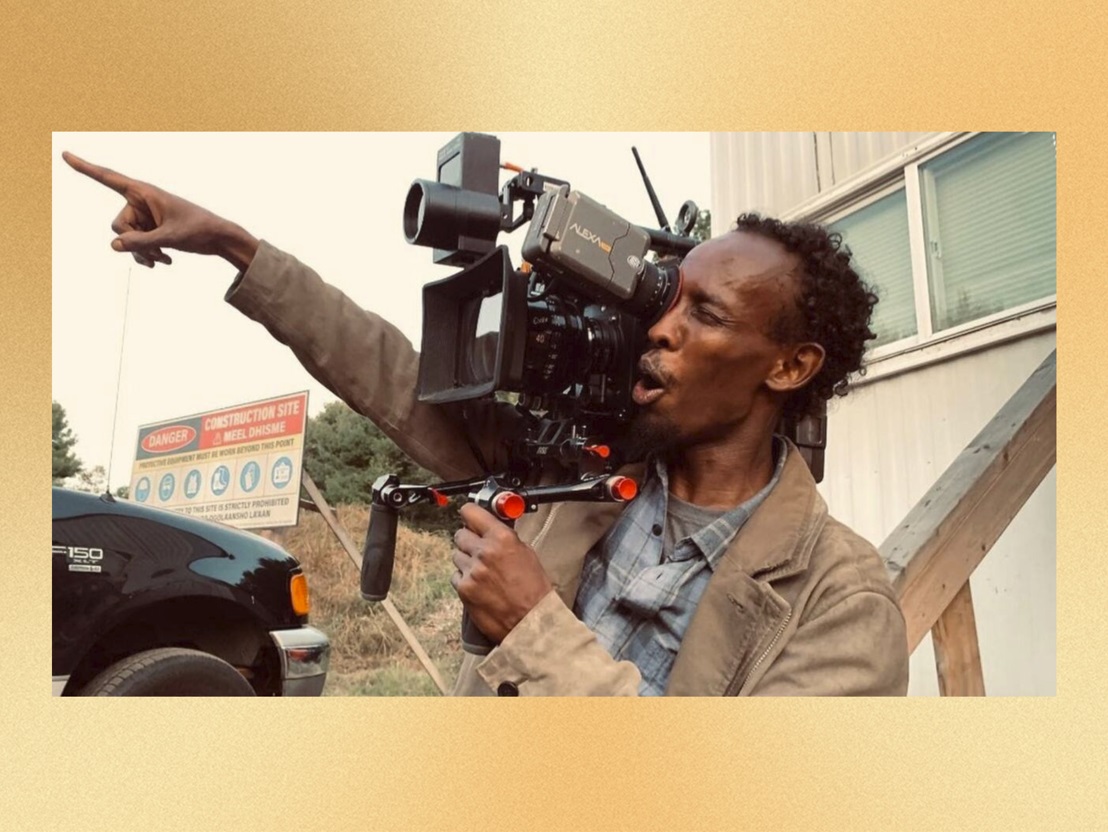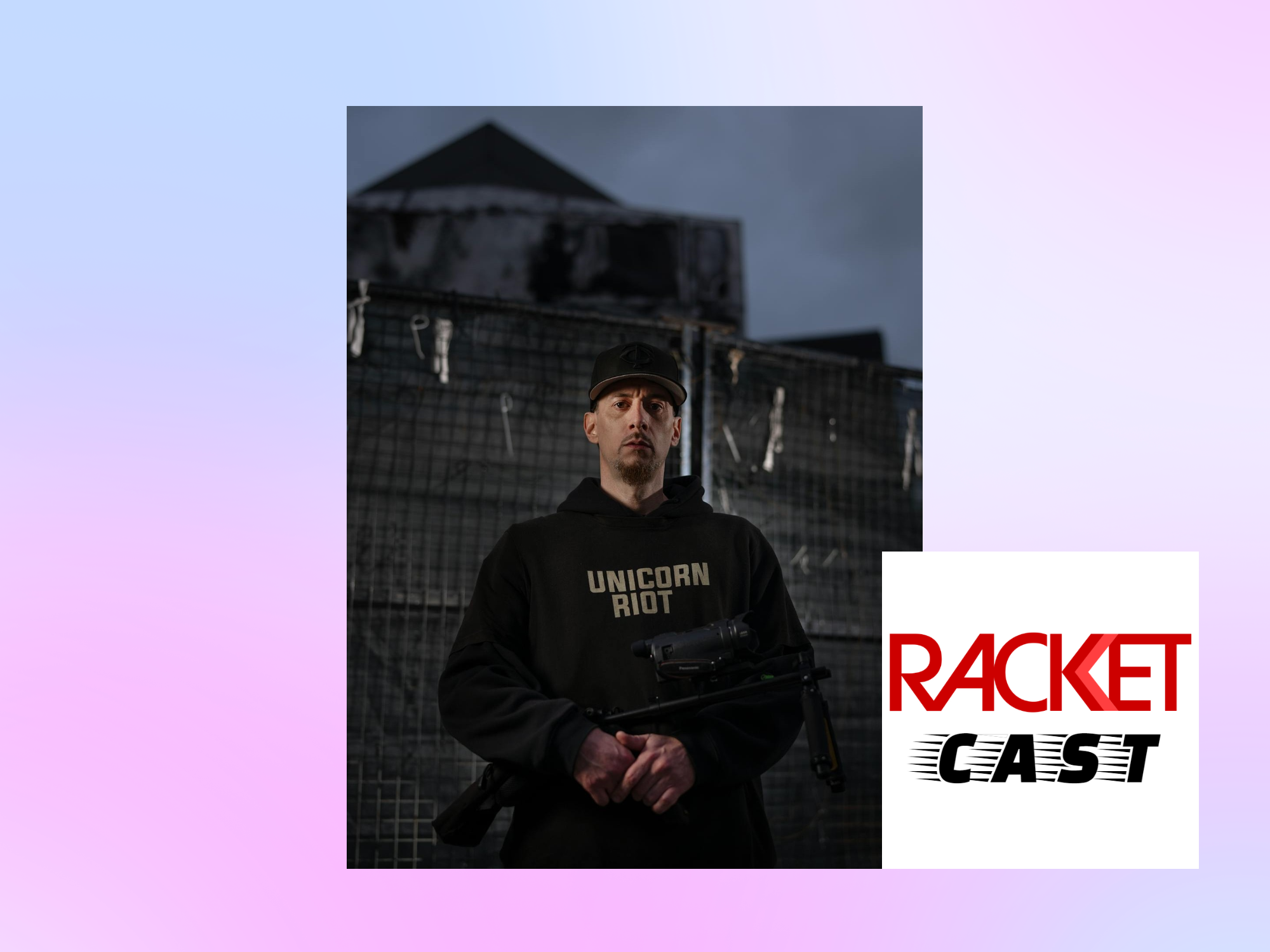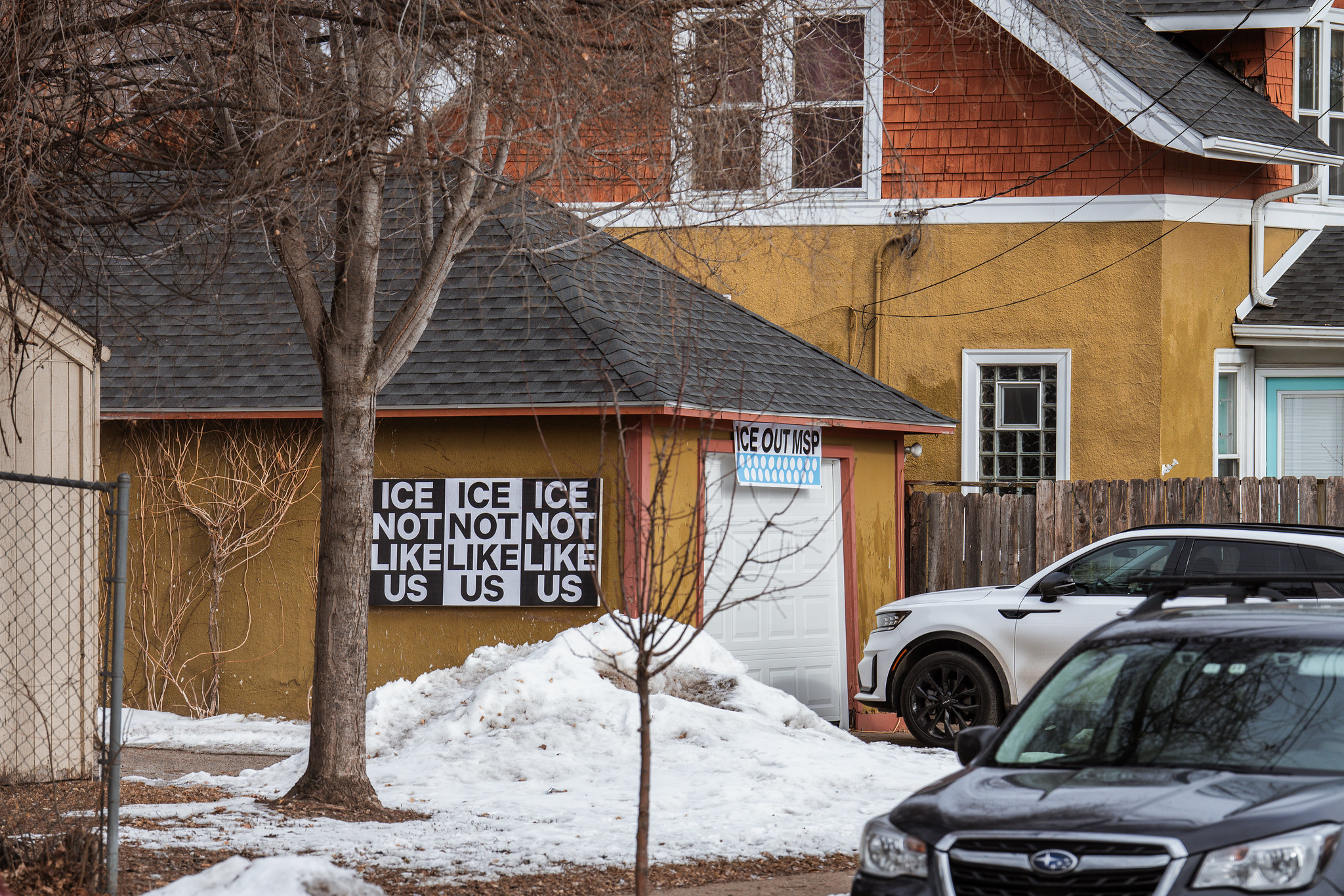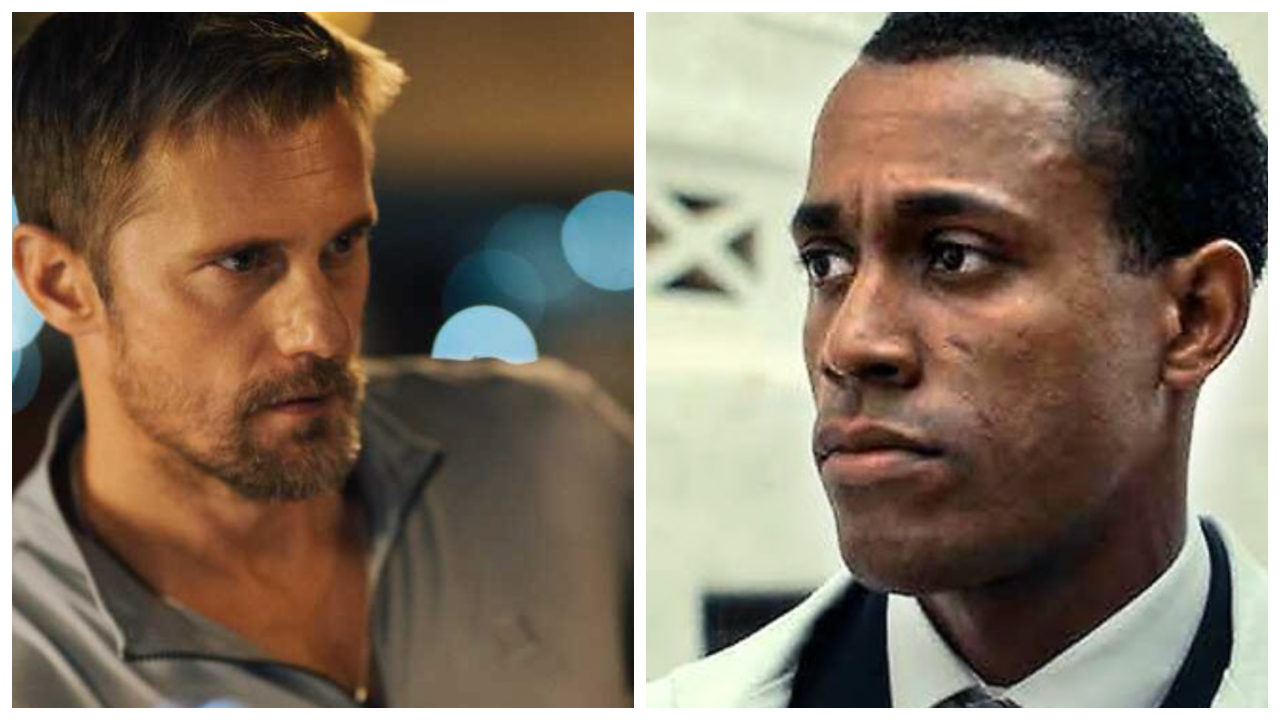The Curse might be history’s most uncomfortable TV show.
Created by two skilled veterans of intentional squirm, Nathan Fielder and Benny Safdie, the new Showtime sci-fi comedy takes viewers through a gauntlet of extreme discomfort—social, racial, class-based, you name it. One close-up shot of physical distress, however, takes the cringe cake. (Another tight look at micro-pensises comes in second.)
In it, a struggling East African single father named Abshir is more or less coerced into a massage to placate Asher, our white-guilt-stricken protagonist played by Fielder. There are cracks. There are winces. There’s the slow-boiling feeling Abshir’s head might pop off in a moment of Cronenbergian horror.
And the man whose head is being manhandled is a familiar one: Minneapolis actor Barkhad Abdi.
Because of his storybook breakthrough in the 2013 Tom Hanks vehicle Captain Phillips, Abdi might feel cemented in time culturally, forever linked to his movie-defining line: “I’m the captain now.”
But that high-profile role in The Curse serves as a welcome reminder that he never went away. There aren’t any gaps in the 38-year-old’s résumé, and his determination to forge a showbiz career after being plucked from obscurity has made him one of the most successful Minnesota-launched talents of the past dozen years, not to mention one of Hollywood’s most-visible Somali actors.
“I had no doubt: I really believed in myself,” Abdi told Racket last week from his home in Minneapolis. “It has been a journey, and, honestly, I feel like I’m still trying to make it.”
Escaping Mogadishu for Minnesota
Barkhad Abdi fondly remembers his early youth in Mogadishu, Somalia’s most populous city and its capital. Things changed with terrifying urgency in early 1991. That’s when, as an opening salvo to the Somali Civil War, rebel soldiers with the United Somali Congress stormed Mogadishu, ushering in violence and chaos that has yet to subside. Abdi says he was supposed to start elementary school the day the war broke out—"I had my school uniform on."
“There was peace, it was a very close community,” remembers Abdi, who was six at the time. “Then, all of a sudden, guns were everywhere and we couldn't go outside. Bullets all day, all night. People screaming. We were stranded in Mogadishu for about a year or two… it was very scary times, but we managed to escape.”
Abdi, alongside his mother, sister, and two brothers, eventually fled the country to join his father, who was teaching in Yemen. The refugee family would stay on the Arabian Peninsula until Abdi turned 14.
“I did not know about Minnesota until we came to New York, and were told, ‘That’s where you’re going, that’s where everybody’s at,’” he says. “We arrived here in the summer, it was just gorgeous. But we came to the inner city and there were also drugs, police—there was a lot happening.”
The Abdi family settled in the Phillips neighborhood of Minneapolis, just south of downtown near the Franklin Library. Abdi mostly spoke Arabic, so he found himself in the challenging position of having to learn English for school and Somali for socialization at the same time. While he loved soccer, he struggled to find a community of players to latch onto; along with fellow recent refugees, he endured being called “Flight 13”—a diss Somali-Americans reserve for more recent arrivals—and got jumped multiple times while learning to ride the bus.
Abdi eventually graduated from Washburn High School, where his dad worked as a teacher, but he fell in love with moviemaking while enrolled at Roosevelt High School. During an elective course on video production, a teacher named Mrs. Howard taught him the basics of camera operation. For his first project, he filmed a friend, another Somali-American from Yemen, who had earned a reputation as the school’s finest dancer. His buddy’s instruction: Make it look like a Michael Jackson video.
“I set up my tripod, and I just recorded him,” Abdi says. “It came out amazing; the teacher was thrilled.”
He was instantly hooked.
The Lean Years
Life after graduation didn’t come easy for Abdi. He matriculated to college in the Fargo-Moorhead area, though he ultimately dropped out. “I didn’t know what I wanted to do, I made mistakes,” he says, alluding to low-stakes legal issues around credit cards and, much later, drugs. He moved home, took some classes at Normandale Community College, and generally fell into a depression.
“I was at a very low point in my life when I came back to Minnesota, because a lot of people had high expectations of me,” Abdi says. “I was a bright kid, but things didn’t work out the way I wanted.”
Around 2008, while he was working odd jobs to afford rent, a bolt of inspiration struck: Abdi quit his job, sold his car and every other valuable position, and invested $4,000 into video-production gear. “People thought I lost my mind… I had nothing left,” he says.
“That’s when I decided to pursue this dream of mine to make a Somali movie here in Minnesota, because the demand was high,” he continues. “I was just hoping to tell our story as first-generation Somali-Americans—there were so many misunderstandings.”
Abdi poured everything he had into the project, which boasted a Somali-language title whose translation might've raised some trademark obstacles: Boys in the Hood. Excitement around it kept growing, he says, with members of the community clamoring for a release date.
As the production dragged on, Abdi’s life would bottom out once more when he got in a nasty car wreck along I-35W in south Minneapolis.
“You see the scar on my forehead? That’s where that came from,” Abdi says today. “All my equipment was destroyed in the process… I was bleeding, I went to the trunk, it was all dented up, and that’s when I knew. My family decided I had lost my mind… ‘Enough is enough, you spent three years trying to make a movie that isn’t going anywhere.’”
For about a year he went back to “the way normal people live,” working as a driver at a relative’s limo company. Boys in the Hood was tabled, never to see a release.
Then came the audition of a lifetime.
He’s the Captain Now
In 2011, Abdi noticed a TV ad for an open acting audition at the Brian Coyle Community Center near Cedar-Riverside. He had no way of knowing he'd be among 1,000+ East African actors across three states vying for the role of Somali pirate leader Abduwali Muse, a real-life figure who by then was serving a 33-year federal prison sentence for (you guessed it!) piracy. Abdi checked every box presented to him on a form inside the Brian Coyle Center, including one that falsely indicated he could swim. Despite years of moviemaking, he had rarely stepped in front of the camera.
“There’s a stigma in our community around being an actor. In reality, a lot of people want to do it,” he says. “I needed to take the chance… I couldn’t live with myself if I didn’t. And I didn’t think I’d get the part; I just needed to satisfy my ego.”
The audition process dragged on for a month, switching locations all over town as wannabe actors were whittled off the list. The life-changing moment, the realization that he’d gotten the Captain Phillips part, arrived without much of a climax. Abdi found himself on a plane to Hollywood, pretty certain that meant he had landed the job. Three of his buddies from Minneapolis also earned roles.
“It was a whirlwind,” he says. “And when I got to L.A. to meet director Paul Greengrass, that’s when the scary part began.”
Abdi says his technical knowledge—how cameras were angled, how scenes were staged—served as an inherent advantage for the rookie actor. Everything came pretty easily; leading man Tom Hanks, naturally, was a mensch on set off the coast Malta and during the subsequent media blitz. Abdi earned wide acclaim for his performance in the high-seas hijacking thriller, which went on to make over $200 million. Here's movie critic Scott Foundas, raving in his review for Variety.
Where Greengrass’ earlier true-life tales were principally group studies, his latest is very much a tale of two captains—Phillips on the one hand, and the pirate leader Muse (Abdi) on the other. Though he himself is but a low-ranking functionary in a vast piracy hierarchy, Muse is head honcho on the Alabama, and Abdi (a Somali-born American emigre making his film debut) plays the role with the hungry intensity of an oppressed man taking his turn at being the oppressor. In a movie that affords little dimensionality to its characters, Abdi finds notes to play you scarcely realized were there, until this reedy young man with jutting brow looms as large as Othello.
“[Abdi] had this instinct for expression; he is a very interesting man,” Greengrass, the British director behind Captain Phillips and the Bourne franchise, told the Hollywood Reporter. “His ability as an actor is rooted in personal experience and a sense of drama.”
Abdi won a BAFTA award, and received Oscar, Golden Globe, and SAG nominations; he appeared on the light-night talk show circuit; his ad-libbed, scene-stealing line (“I’m the captain now”) became a pop-culture catchphrase. As a 27-year-old newcomer, he was cautiously optimistic about using Captain Phillips as a launching pad for his acting career. Considering how few other Somali actors existed within the industry, he realized he’d have to blaze his own unique path.
“I wanted to prove to everyone I was an actor, not some one-hit wonder,” he says. “That was the obvious way out for me, but I refused that.”
Much was made of how little Abdi had been paid for a co-starring role that earned him an Oscar nom for Best Supporting Actor, which he’d lose to Jared Leto for his performance in Dallas Buyers Club. The sum was reportedly $65,000, and a press cycle swirled around Abdi returning to Minneapolis to work at his brother’s Cedar-Riverside cell phone shop.
Today, Abdi pushes back against a media narrative that seemed to suggest he’d given up acting; in reality he was working auditions and scheming with his newfound manager—he was unrepresented when his debut film premiered. “But ya know, obviously there’s no denying I was broke after Captain Phillips,” he says with a chuckle.
Abdi moved to L.A. in the mid-’10s and, while simultaneously pursuing movie roles, decided to try the one industry that might have a higher failure rate than acting: the restaurant game. He says his now-closed Somali restaurant in Inglewood was “the hardest thing I’ve ever done,” noting that everyone in his life, yet again, told him he was nuts. “Obviously I don’t listen, but I don’t regret a thing about it,” he says, adding that his restaurateur era, just like his phone salesman era, coincided with an acting career that never let up.
Telling Refugee Stories, Minnesota Stories
Abdi's acting encore would come quickly with 2015’s Eye in the Sky, a drone warfare thriller starring Helen Mirren, Aaron Paul, and Alan Rickman. He appeared in four films in 2017 alone, including the Pacino-starring Pirates of Somali (“very, very special”), the Safdie-directed Good Time (“we connected over realism”), and future Dune director Denis Villeneuve’s Bladerunner 2049. Abdi enjoyed his longest TV run as part of a star-studded cast on Hulu’s Castle Rock, a 2019 psychological horror series inspired by the works of Stephen King.
And about that agonizing massage in The Curse?
“That scene… that scene…” he says with a laugh. “It was the last one I did, and to be honest with you, it was a real massage: He did actually crack my neck. You can imagine, there was something real there; the masseuse kinda panicked, but I left the set feeling great.”
Abdi moved from L.A. back home to Minnesota during the pandemic. Zoom auditions are still the industry norm post-COVID, so he’s able to seek work while hanging out with friends and family. He even looks to fellow Minnesotans for inspiration: Abdi is a big-time fan of the Coen brothers (“Every one of their movies is a classic”), and would love to one day collab with the famous directing duo from St. Louis Park, though they’ve never met.
“I’m a low-key person, I could be right next to you and you wouldn’t notice me,” Abdi says of life in the Twin Cities. “Mostly I’m home writing screenplays. I never thought that’d be the case. I love it so much, it’s crazy—writing and directing is my long-term goal.”
Tentatively titled Our Love Is Bigger, a just-finished script by Abdi tells the harrowing tale of immigrants crossing the Mediterranean Sea from Africa en route to Europe. And that old footage of Boys in the Hood? Abdi says it’s collecting dust somewhere, but he’s in a much different place now from when he was a hungry, hard-luck kid trying to make it in Minneapolis.
“I’m very proud to open doors, to be that one person,” he says of being one of a handful of famous East African actors in Hollywood. “I want to help others by writing, directing, telling stories… stories about refugees, stories about Minnesota, my story.”






